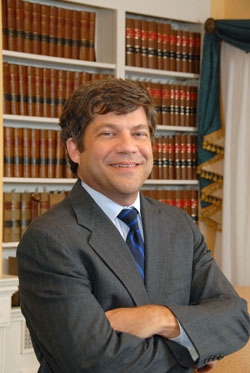The Guantanamo conundrum
Law School professor addresses the ramifications of closing Guantanamo Bay
Civil libertarians who saw the Guantanamo Bay Prison Camp as the embodiment of everything that was wrong with President George W. Bush’s anti-terrorism policies cheered President Barack Obama’s executive order mandating its closure.
But some of these prisoners aren’t welcome in their home countries. And some may have committed other crimes or harbor malevolent intentions toward the United States.
So what options does President Obama have in taking the next step to close the prison?
Peter Spiro, a professor in Temple University’s Beasley School of Law who specializes in international law and the author of the new book Beyond Citizenship: American Identity after Globalization, has been following the developments in Guantanamo Bay and was among the lawyers participating in an October 2006 teach-in on the topic.
Spiro sees Obama’s decision as a good news/bad news proposition. The good news, he said, is that with one stroke of
the presidential pen the United States has improved its standing with the international community. The bad news is that clearing out Guantanamo comes with its own set of complications.
The first one: “What do we do about the detainees whose home countries refuse to take them back?”
“Some of these individuals pose no threat, but they can’t be repatriated,” Spiro said. “If the U.S. has deemed these individuals to be dangerous, why should we risk taking them back? Obama is going to have to use his diplomatic resources to get them back into their home countries.”
The other complication: What do we do with the prisoners who are dangerous and have done things that they should have to answer for?
Some Guantanamo Bay detainees could probably be convicted in a federal court based on the evidence gathered against them because it was collected in accordance with American rules of evidence, Spiro said. But evidence that may have been obtained by torture would almost certainly be excluded.
So what options does the United States have to prevent these detainees from planning or carrying out their next terrorist attack?
One option, Spiro said, is to transfer the detainees to another base, such as the Bagram Air Force Base in Afghanistan. But that option would be perceived by civil libertarians and the international community as simply hanging the indefinite detention shingle in another location.
“Bagram is already attracting international attention,” he said. “If the detainees are moved there, Bagram becomes Guantanamo.”
Perhaps the best of all possible options would be to bring the rule of law into the process in the form of something resembling a federal court, Spiro said. Because the military tribunals that were part of the Military Commissions Act of 2006 have fallen into disfavor, the government has to come up with a new system, he said.
“You have to start from scratch because the military tribunal system has been discredited,” he said. “So, one of the things that the United States could do is to create a new national security court. It would be outside the federal court system, but the detainees would have more of a right to due process than they did under the military tribunal system.”
